Are you skills-first or skills-last?
Just kidding. It’s not that simple. But sometimes it can feel very all-or-nothing when you’re exploring skills-first principles, or focusing on the skills people have and gain rather than their job titles or the auspiciousness of their college degrees.
With many businesses committed to becoming skills-based organizations—43% already consider it a guiding principle, according to our recent LinkedIn poll—there’s a lot of enthusiasm around this revolutionary idea. And for good reason. The data backs up its effectiveness.
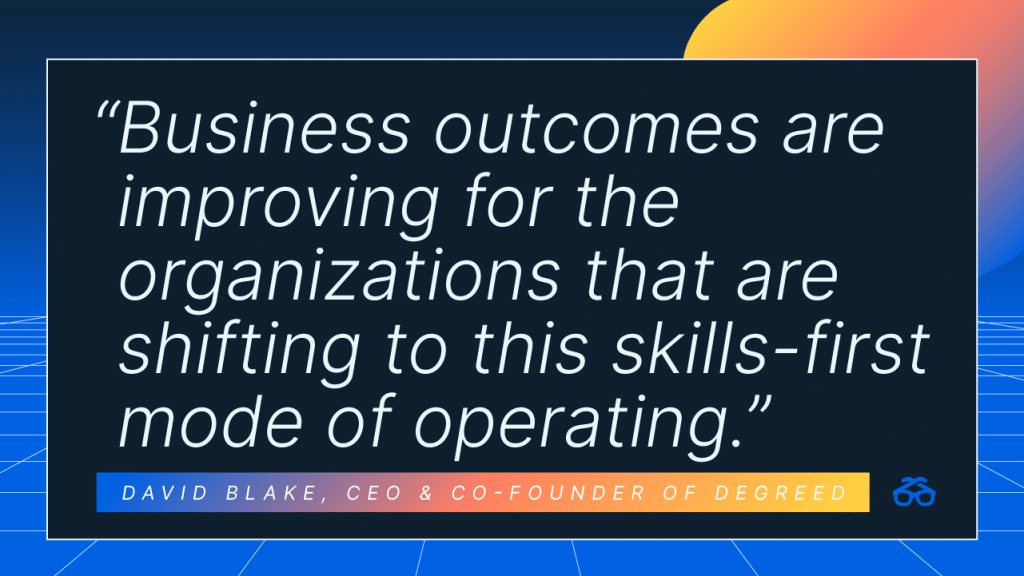
Today, we shared our long-term plan and product strategy with more than 1,500 L&D professionals at Degreed Vision 2023. With the state of L&D and what it takes to build a modern and effective workforce in mind, we’re introducing a wide range of enhancements to our platform—tools for automation, AI content searching and curation, deep skill development, and skills data analysis.
Frankly, there’s never been a better time to join the skills-first revolution and advocate for skills and learning across your organization. But to do it right, you need the right tools, capabilities, and insights.
Note: The images in this post are for demonstration purposes only; Degreed product enhancements remain works in progress and subject to change.
The State of L&D
Your workforce isn’t the same as it was a few decades ago, or even a few years ago, no matter how good your employee retention is.
Over the years, the way people think about employee learning has evolved. Employees no longer see learning as strictly humdrum mandatory training requirements but instead see it as a desirable (and arguably vital) employee benefit. With the global skills gap growing by the day, companies need learning in order to keep pace with the fast-changing world and retain great workers.
“Thirty years ago, healthcare was that benefit you needed to attract and retain the best people,” said Micheal Moe, Founder and CEO at Global Silicon Valley (GSV), who spoke at Vision. “Increasingly, education is a benefit that the workforce is looking for… Lack of development is the number one reason why people leave their jobs.”
With learning and upskilling rising in business value, skills are increasingly important, and companies that aren’t recognizing and preparing for this will soon be left behind. According to David Blake, CEO and Co-founder of Degreed, skills-first learning is no longer just a dream; it’s “something companies are mobilizing to. And the companies that are, are seeing huge improvements in their retention, in their innovation, efficiency, and talent. Business outcomes are improving for the organizations that are shifting to this skills-first mode of operating.”
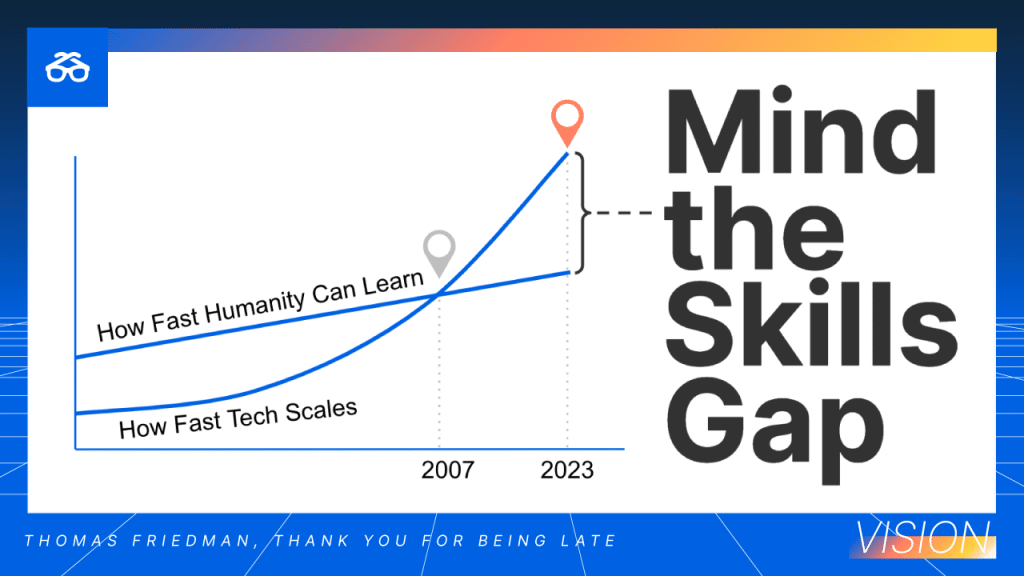
Four years ago, digital learning was projected to be a $1 trillion market by 2034, Moe noted. However, due to technological advancements and the effects of the Covid-19 pandemic, that timeline was cut in half. The new projection? Digital learning is estimated to reach that milestone by 2027—less than four years from now, Moe said.
With all this in mind, we at Degreed aren’t slowing down. On the contrary, we’re ramping up! The enhancements we expect to roll out will ensure you’re prepared to launch into the future.
Automated Learning Communications
Time is one of the most valuable assets in any organization, and new automated learning communications and reminders on the Degreed platform will help you maximize the efficiency of your learning program with minimal administrative effort. After an admin creates an automation—for a specific group, team, job role, or individual, for example—they’ll be able to automatically send Degreed platform notifications or emails from within Degreed.
Regular learning nudges, invitations, and communication workflows powered by Degreed will ensure your employees are encouraged and reminded of the importance of their development without the manual admin work to make it happen.
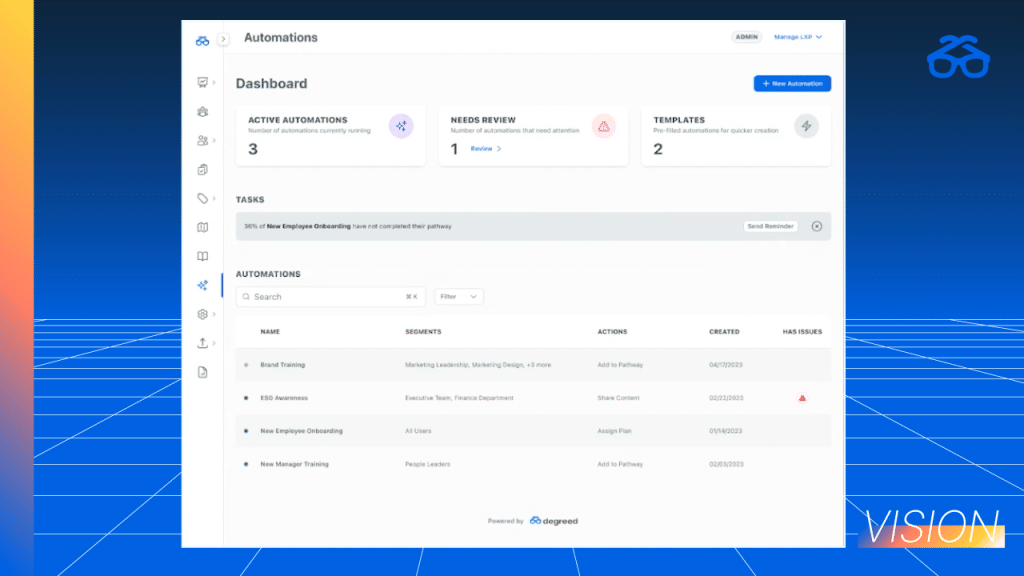
Want to invite all new team members to explore a Pathway? Create an automation. Want to set subsequent and regular reminders to complete that Pathway? Create an automation. Want to encourage less engaged learners to get back into the platform? Create an… Well, you get the idea. It’s easy and intuitive; you can build and schedule them in just a few minutes.
AI-Assisted Learning & Actions
We simply can’t discuss advancements without talking about AI. Going forward, AI will be woven into several key Degreed functions to enhance the user experience and increase efficiency. Why? Because AI is infiltrating our world at lightning speed, and it’s quickly becoming the key to a more personalized, customizable, interactive, modern, and efficient learning experience. In the words of Michael Moe: “AI is like air. It’s invisible. It’s ubiquitous.”
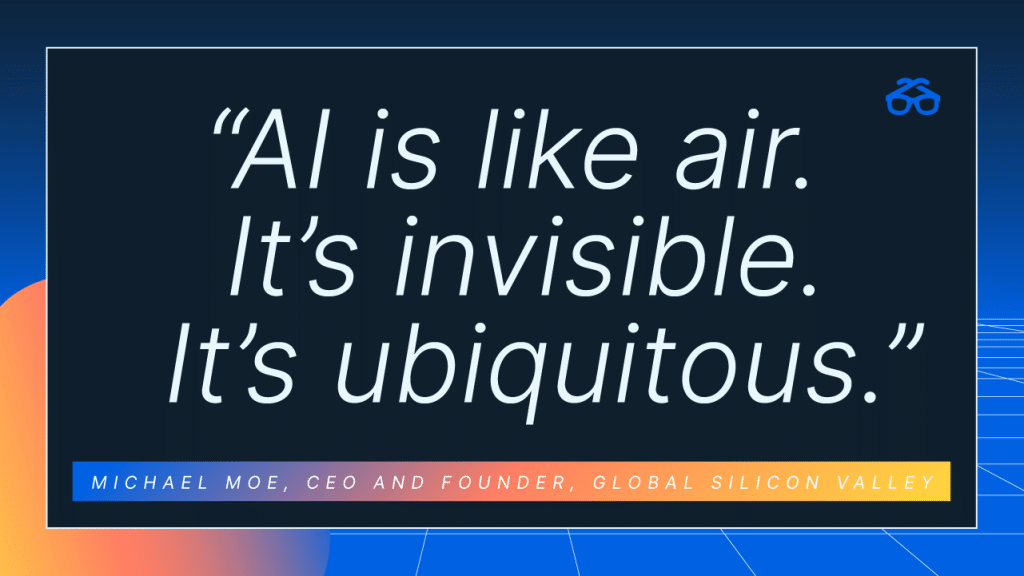
The rate of technological advancement has surpassed the rate at which humans can learn, noted Blake, who suggested AI might be the bridge needed to overcome the gap. “This moment is bringing a shift that’s unlocking our ability—for the first time—to deal with skills at scale and to unlock the future.”
You’ll see the fingerprints of AI on many of our upcoming features, including our new Learning Hub landing page and content personalization tool. But the most obvious place will be in our new Degreed Assistant.
Degreed Assistant will be an AI chat tool designed to have interactive conversations about learning content and development goals. It’s designed to help your people find niche content they’re interested in and to curate content and Pathways in a fraction of the time it takes today. It’ll be useful to support employees on the go, like deskless workers, who can use voice-to-text or send photos to the AI chat thread from a mobile device. Degreed Assistant will act as a personal, real-time learning coach.
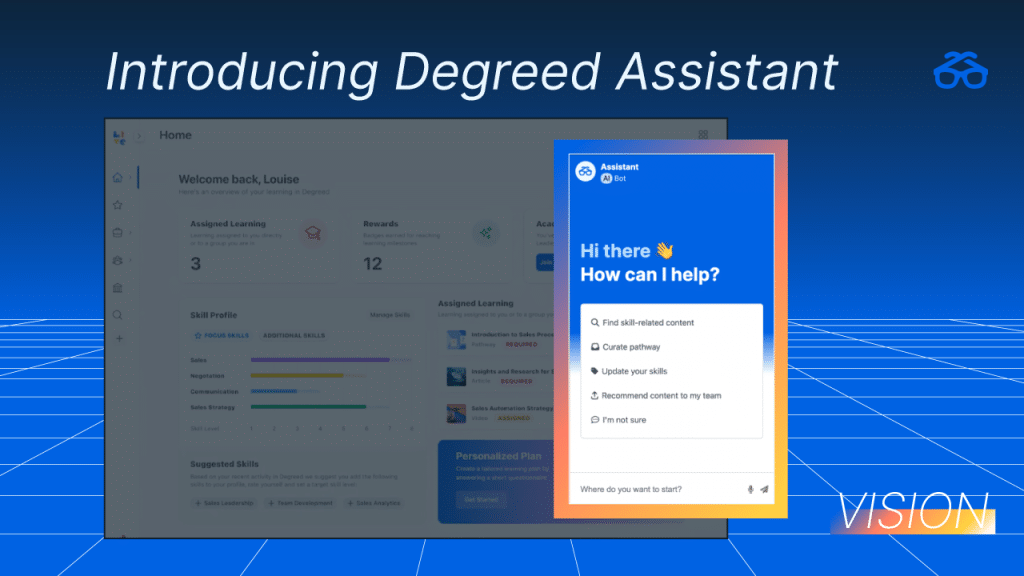
Degreed Academies & Degreed Content Marketplace
In 2023, we added Degreed Academies and Degreed Content Marketplace to our product suite. These new additions promote deep skill-building to quickly and effectively close critical skills gaps. How? Filling many of the emerging skill gaps requires expert guidance. It means giving employees more time to learn. It means supporting a collaborative, practice-based learning environment that values feedback. These products provide all that and more. They unlock more collaborative, customizable, and in-depth learning experiences ranging from curated content and group projects to learning stipends and full-length courses.
Right now on Degreed, you can already access all of our products from one another. Our next big move will be to make that transition even more seamless by displaying learning, opportunities, and data from all your Degreed products in one place.
Your people will be able to view holistic, valuable data points on the new Learning Hub, which will replace the current Degreed LXP home page. With its updated interface, employees will be able to use the hub to easily track their skill development progress, see dynamic personalized content, view assigned learning, and explore relevant Pathways and academies—all in one place.
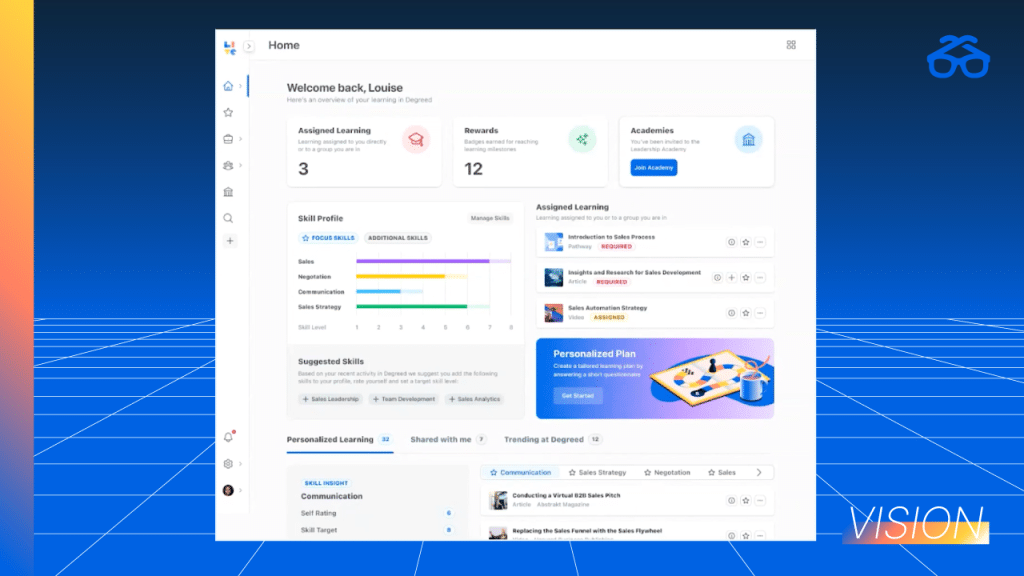
Skills Ingestion & Taxonomies
Right now, skills data is both a massive opportunity at most organizations and, for many, a roadblock to embracing skills-first strategies. That’s because many organizations track skills in disparate systems with mismatched rating scales. That’ll change with our upcoming skill normalization capabilities, which will allow system managers to centralize skills data from multiple sources and “translate” skill ratings from various systems into one common skill rating “language,” or rating scale, so all data can be seamlessly combined, effortlessly read, and collectively assessed.
This level of visibility will be a game-changer for learning professionals otherwise limited by siloed development data that, even if centralized, gets lost in translation. It’s much easier to act on data when it’s all in the same language.
And speaking of more skill insights, we’re enhancing skills taxonomy creation capabilities in Degreed. Soon, you’ll be able to build AI-assisted, full-scale taxonomies on our platform.
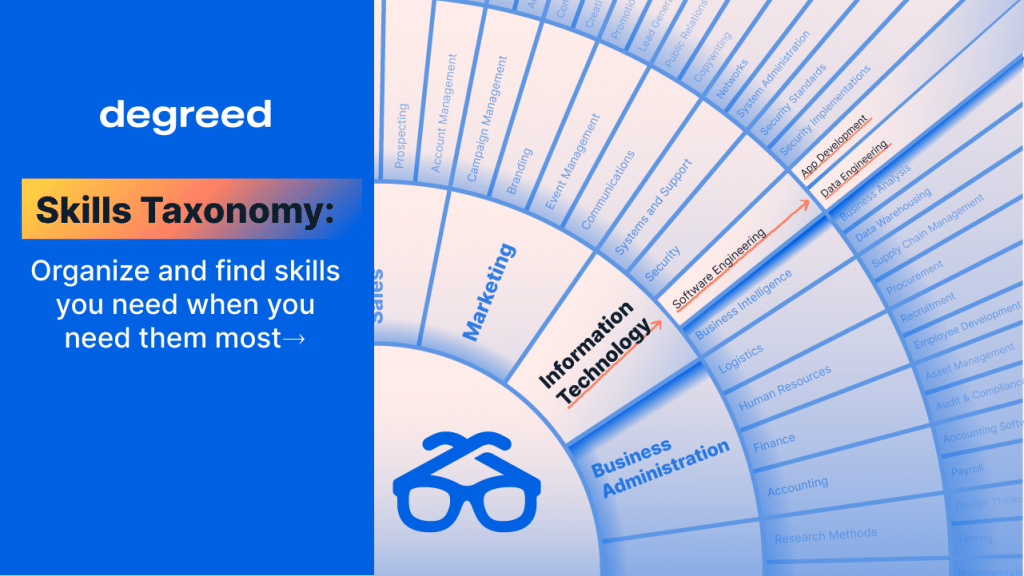
We’re also creating new skill inference tools. You’ll be able to use them to analyze your organization’s job descriptions then add mentioned and inferred skills from those descriptions to applicable user profiles as well as organization-wide taxonomies. Our goal is to make skills-first business strategies easier and free you of the cumbersome manual work.
What’s the timeline?
You might be wondering “When will I get to try all these features?” You can expect many of our skills-related features to be available in the 2024 calendar year. In addition, some of these updates such as skills normalization, taxonomies, and Academies, are separate products and won’t be included in a standard LXP or LXP+ subscription. Keep an eye on our Major Product Release webinars and notes for more detailed timelines and other feature release dates. We’re excited to share more as features get closer to release.
Watch Degreed Vision 2023 on demand—for a deep dive into more details and to see prototypes in action.
